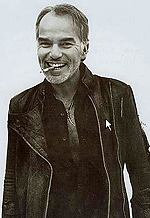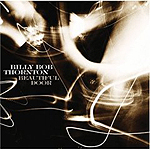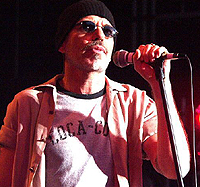 Billy Bob Thornton
Billy Bob Thornton
'Opening Destiny's Door'
Oscar-winning actor/director/writer/musician Billy Bob Thornton was raised in Arkansas by his high school basketball coach father and psychic mother. He began playing drums at the age of 12, eventually joining a Creedence Clearwater Revival cover band in high school.
After college he spent time in local bands like Blue & the Blue Velvets, Nothin' Doin', Cottonwood, and Hot 'Lanta, playing colleges and high schools throughout Arkansas and Texas. Nothin' Doin' became Tres Hombres, a ZZ Top cover band in the early '80s.
After hitting it big in Hollywood, Thornton decided to return to his first love, music, and record an album. The dark and personal Private Radio arrived in 2001 on the Universal imprint Uptown. Produced and co-written with country legend Marty Stuart, it featured session work from some of Nashville's finest. Sanctuary released Edge of the World in 2003, followed by Hobo, released on the Big Deal label in 2005. Now in 2007 New Door Records has brought us Thornton's fourth album, BEAUTIFUL DOOR.
Thornton has also appeared on albums by Earl Scruggs (Earl Scruggs and Friends), the Bastard Sons of Johnny Cash (Distance Between), and Warren Zevon (The Wind).
Being that this is your 4th album of music, I was wondering how you’ve changed as a singer/songwriter/musician since 2001’s PRIVATE RADIO? ”Well, for one thing this is the first record that I’ve done with my guitar player Brad Davis. He's always been in my touring band and he’s always played on the records. Brad’s always been my real partner in all this, but it's the first record where he and I have done all the writing. Although, for the most part 98% of the lyrics are mine and he mostly does the music – but then we both wrote the music on it also. So, it gave us a chance to do kinda our own record. This one I produced on my own – with Jim Mitchell as a co-producer – but really, every decision on this record was mine."
"So, because of that I think that it was just more comfortable to make and I didn’t mind being the boss. And to be able to work with a guy that sees eye-to-eye with me on everything is pretty great. So, this is probably my most pure record in terms of just doing exactly what I wanted to do. And I think sonically and lyrically it’s got a really nice evenness to it.”
Being that this was the first album you’ve taken more of the producing reins on, were there ever times of self doubt? ”Well, not really because I’ve always been in on producing the records. Just not solely. So, I was pretty used to it. And it’s not a whole heck of a lot different from directing a movie really, in some ways. Because a movie director and a record producer are basically the same thing. Whereas a movie producer and a record producer are very different. Movie producers just have lunch a lot and talk about how they can’t use ‘old lady so-and-so’s yard' and that they’ll have to 'move somewhere else'! They work on budgets and things like that. It’s not as creative a job as being a record producer or being a movie director.”
”What’s interesting about this record is that Brad and I stated writing songs for it quite a while back. In the beginning we didn't really pay attention to what kind of songs we were writing. We'd just write what we feel like at that moment. So, we ended up with about 25 songs demoed! And so we had 6 or 7 songs of the same ilk to fit a record – so, we could have made three 6 or 7 song records – but we didn’t have the 11 or 12 to fit the one record. It just so happened that we kept writing until we had 30 odd songs … and it turned out that the last 12 songs that we wrote are all on this record. Which is pretty great as we finally hit a stride and figured out what the record was about and how it was gonna sound.”
This new album lyrically focuses on lives and relationships that ended too soon, misguided politics re: the war and such, two suicides; a boy who died too soon, and so forth. So, is it fair to say that these new songs; songs that completely veer away from the internationally known actor/director, are reality-based tales that allow you to more than wear your heart on your songwriting sleeve? ”Well, in terms of the political and suicide songs, I’ve always done that. But what’s different this time is where I've always had a few songs that were more politically orientated, this time they’re on a more global level more than a personal level. Even though they still to relate to things that are a broader issue."
"‘Hope For Glory,’ ‘Beautiful Door’ and the song ‘I Can Tell You’ – which is really about a Veteran saying ‘I’ve done some pretty bad things, and I’ve had some pretty bad things done to me, so I don’t know if you really want to get involved with me right now' – are all from a personal viewpoint. But they relate to bigger topics. ‘Hope for Glory’ is a song about … well, today America is kinda looked on as a bad guy in a lot of ways and the song is about ‘Hey listen, as Americans it’s not that we don’t want to be patriotic and that we’re not patriots because we are. It’s just hard to be patriotic under the current conditions. We would love to be able to wave the flag again, but right now we can’t.’ We're gonna have to change some policies before people get comfortable with that again. And ‘Beautiful Door’ is about ‘Hey, let’s not mix religion, politics and war so much, OK ‘cause not everybody believes the same thing.”
 What’s the blurred b/w imagery represent on the front cover to ‘Beautiful Door ‘ … and why was it entitled that? ”Yeah … Miriam Santos – who did the photography – she and I got together and I told her I didn’t want to make this on the money. But the title of the record is ‘Beautiful Door’ – and beautiful door in the song means there’s some people who because of their religious beliefs believe that there’s this magic door that you open into Heaven … and that the way you open it is by killing off people you don’t believe in!"
What’s the blurred b/w imagery represent on the front cover to ‘Beautiful Door ‘ … and why was it entitled that? ”Yeah … Miriam Santos – who did the photography – she and I got together and I told her I didn’t want to make this on the money. But the title of the record is ‘Beautiful Door’ – and beautiful door in the song means there’s some people who because of their religious beliefs believe that there’s this magic door that you open into Heaven … and that the way you open it is by killing off people you don’t believe in!"
"So, I didn’t want to have a record jacket that had a door opening and beyond the door is a sky with stars or something. We didn’t need to be on the money with it. I said let’s make some confusing sort of portal, something where you can kind of see an image disappearing into something, you know. Because the whole point of that song is that line we feel we cross when we die is not so clear to everybody. So let’s make it that. And, on the back cover there’s an image of a guy back there in the distance and it’s very blurry. And he’s walking away into something. It’s like some people seem to have a very clear definition of what that is but the rest of us don’t … but we certainly don’t want to tell people we know. But, it seems with religion each faith seems to have its own idea of what that is and so you add all those religions together and it’s a very blurry door.”
From those humble beginnings listening to your parents’ record player churning out Ray Price, Jim Reeves, Elvis, Herb Albert, and even Rod McKuen, how long after was it before you decided that music was where your career choice lay? ”From the time I was in the Third Grade, around 8 or 9 years old I knew that I wanted to be a musician and songwriter. Actually, way before I came to California and got into acting – in about ’77 or so - I had gone to Nashville to be a songwriter. Back then … well, people think it’s hard these days in the music business, it was really, really hard to break in in those days - and there were fewer connections into it. And, it didn’t work out so well, but I had some people that thought I was a good songwriter, but that was a very cliquey group in those days re; songwriters and trying to break in."
"And I was just a dumb ass, I didn’t know what I was doing in terms of getting my foot in the door. But, yeah, I was always into music … I played in bands from the time I was a kid. It’s kind of odd that just because you’re famous in one field that somebody will ask you the question of ‘What makes you want to keep making records?’ and ‘What drives you to do music being that you’re an actor?” But nobody would ask Jack White or Ozzy Osbourne or Tom Petty that question. I was a musician and have been as long as those guys. So, it always seems to be a bit of an odd question. Which irks me sometimes when one of those guys suddenly does a movie and it makes me think ‘What makes you wanna do a movie?,’ you know,” he laughs. ”And their answer should be ‘Well, I’ve always loved it. I want to be an actor’ … and there’s nothing wrong with it.”
Would you say that acting is your main monetary bread and butter, but that it’s music that is your real passion? ”I would say that I’m definitely involved when I’m not working. I’m definitely way more involved in music and listen to music way more than I watch movies. For instance, I can tell you the line-up of the Dave Clark Five, but I can’t tell you who’s starring in the latest movie. I don’t know half the actors in movies. I’m not one of those guys like Martin Scorsese who’s an expert on all things movies. I mean, if you start him talking about his being a child and his love of movies he’s so passionate about it. He can tell you everything about every movie, all the character actors who were in the movies in the ‘30s and everything. And I’m more that way about music. I can tell you more about the history of music than I ever can about the history of movies.”
Is it true that back in the day you had breakfast with Johnny and June Cash and that his fully cooked breakfast gave you a horrid migraine?! ”Well, yeah, but it was beyond that as I knew them very well. I had breakfast with them on a number of occasions. I mean, when Cash tells you to eat your eggs you eat your eggs,” he laughs. ”He really did have the Voice of God, let me tell you. Cash was the only person I ever knew who you never got over being nervous around. No matter how well you knew him, or how many times you stayed over his house – I even did a duet with him once that’s never been on a record – all those times, no matter how many conversations we had together, I was always slightly afraid of him. I was so nervous around him. Wanting to always please him. Way beyond the father figure. It was almost like you’re talking to the Boss of the Universe."
"Over the years those guys – Cash, Waylon Jennings, Willie Nelson – have all been very close to me. So, I got a lot of my later musical education from those guys. Cash and Willie Nelson have been like uncles to me … we actually tour with Willie quite a bit.”
Although I honestly don’t concur, does it bother you that some music industry people claim that you don’t so much sing as ‘speak over music’ on your albums? ”I think nobody would ever say that if I weren’t an actor. I don’t think it would ever come up. Nobody said it about Johnny Cash or Kris Kristofferson.”
 At what point did you realize that your gravelly Arkansas drawl could actually translate into a vocal musical entity ”You’d be surprised to hear me do full on rock songs. For anybody who thinks that all I do is country, they should come to the show sometime. We also have another record coming out after this one. It’s a full-on hillbilly record ... but, when you hear this new record there’s some pretty high harmonies and that’s me too."
At what point did you realize that your gravelly Arkansas drawl could actually translate into a vocal musical entity ”You’d be surprised to hear me do full on rock songs. For anybody who thinks that all I do is country, they should come to the show sometime. We also have another record coming out after this one. It’s a full-on hillbilly record ... but, when you hear this new record there’s some pretty high harmonies and that’s me too."
In your press photos for this new album you are not caught smiling in any of them. Is this due to the somber, moody music, perhaps?! ”Well, it turns out that way, but frankly, the technical reason for it would be a migraine headache,” he laughs. ”That particular photo shoot was all about the migraine.”
Have you ever taken any singing lesions along the way? ”Er, no! Or, for that matter acting either,” he laughs. ”I’ve never much believed in studying.”
Finally, so what DOES Billy Bob Thornton believe in? ”I would say … in terms of … I tell you what, it’s a hard thing to say because anyone who says it can sound hypocritical. It’s not like I haven’t lied in my lifetime, because the answer is Honesty. But what I mean by that is it’s not like when my mom says ‘Did you stay out all night and get drunk with your buddy’s?’ and I say ‘Of course not, mom’ … but, I would say in art and in your belief system I think Honesty is the thing."
"In other words you could hear a song that on the surface could sound pleasing and you may hear somebody who sings like a Nightingale, but you don’t care. And then you might hear somebody else like Johnny Cash who sold you the story. And that’s what I believe in … I believe in telling the story.”
Interviewed by Russell A. Trunk
www.BillyBobThornton.com
www.ILoveThatSong.com
Back To Archives

